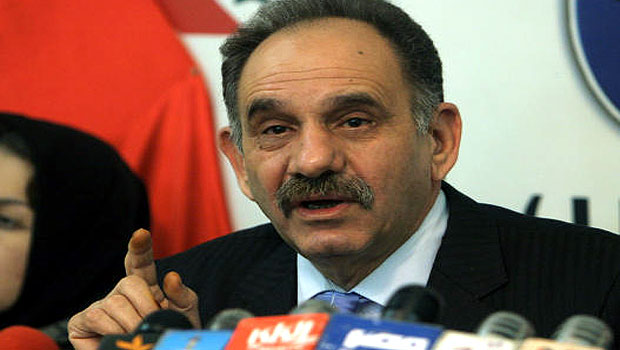
In this January 9, 2006, file photo, Iraq’s Deputy Prime Minister, Saleh Al-Mutlaq, speaks to reporters in Baghdad, Iraq. (AP)
Baghdad, Asharq Al-Awsat—Iraq’s powerful Iraqiya bloc appears to have fragmented in the run-up to forthcoming parliamentary elections, with leader Iyad Allawi forming a new electoral list set to be named the “National Iraqiya” bloc, and prominent members Saleh Al-Mutlaq and Osama Al-Nujaifi negotiating to form a second coalition.
The Iraqiya bloc won the biggest share of seats in the 2012 parliamentary election under Allawi’s leadership, but was ultimately unable to form a new government, allowing Prime Minister Nuri Al-Maliki to form a coalition and secure a second term in power. Allawi’s new electoral bloc largely comprises politicians that were not previously members of Iraqiya.
The remnants of the Iraqiya bloc, particularly the Motahedoun (“United”) coalition led by Iraqi parliamentary speaker Osama Al-Nujaifi and the Iraqiya Al-Arabiya coalition led by Saleh Al-Mutlaq, have now allied and are in the process of negotiating the formation of a new political coalition.
Negotiations are continuing between the two blocs are regarding the leadership and name of this prospective coalition.
Elsewhere, former members of the Iraqiya bloc have united in Diyala Province and have formed a separate coalition set to be named “Diyala Huweituna” (“Diyala Is Our Identity”). In addition, one of the former Iraqiya bloc’s main financial supporters, businessman Khamis Al-Khanjar, has also formed a new bloc in Kirkuk predominately comprised of Arab politicians.
Analysts say the latest divisions among Iraq’s political opposition are the result of the re-appraisal of electoral chances by Iraqi political leaders following the adoption of the Sainte-Laguë party-list proportional representation voting system.
For his part, Mohannad Hussam Al-Din, a member of the political bureau of Saleh Al-Mutlaq’s National Dialogue Front, told Asharq Al-Awsat: “The issue of the Iraqiya Al-Arabiya bloc entering a united coalition under a new name with the Motahedoun (United) coalition led by Osama Al-Nujaifi is in the final stages of discussion . . . but we have yet to announce it [the new bloc] officially.”
However, senior Motahedoun coalition member and Diyala MP Mohamed Al-Khalidi informed Asharq Al-Awsat: “The agreement between Nujaifi and Mutlaq has taken place, and the new coalition will be named ‘Moutahedoun Lil’islah’ (United for Reform).”
As for the political calculations over Iraq’s Diyala Province, with former Iraqiya List members agreeing to remain on a single electoral list, Khalidi said: “Diyala Province has special circumstances, and all parties—whether Kurdish, Shi’ite or Sunni—look at the province in a different manner compared to other Iraqi provinces. Therefore, it is in our interests, as Arab Sunnis, to enter the elections on a united list, particularly as there are no deep divisions between the [former Iraqiya] bloc members that justify a division.”
“The provincial council system has succeeded; we competed in the Diyala Province elections on a united list and won the post of governor,” he added.
Commenting on the Sainte-Laguë election system, Khalidi informed Asharq Al-Awsat that the new system had prompted Iraq’s political parties to unify, despite their differences of opinion.
